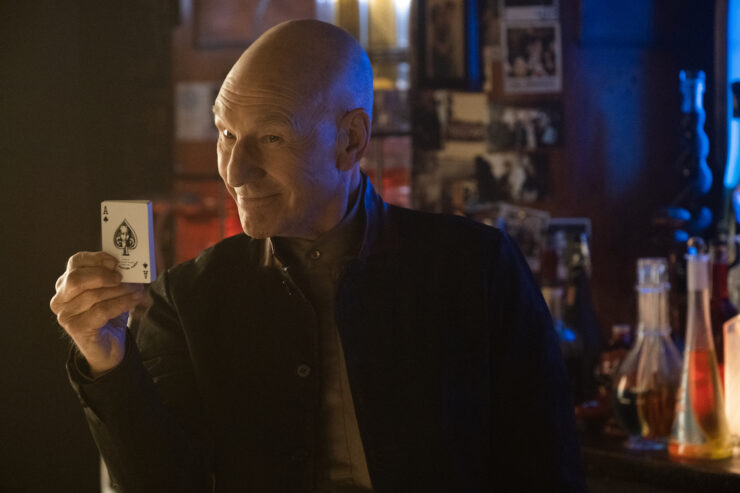Thing That Cannot Be Denied: Picard season three was a huge hit. It got the best viewership of any Trek show on Paramount+, actually rivalling network offerings. It is being talked about all over the place, with lots of people hailing it as the finest season of Trek in ages, lots more simply expressing their joy at seeing Picard, Riker, La Forge, Worf, Crusher, Troi, and Data together again—and on the bridge of the Enterprise-D, no less!
Thing That Can Be Argued: whether or not this season was actually any good…
It’s a constant struggle, and a constant argument: what is popular versus what is great art. The Venn diagrams of the two often overlap, but not always. And it’s easy to forget that some of what we now consider classics of great art were also beloved by many in their time. Probably the best example is William Shakespeare, these days revered in the hallowed halls of Great Literature, but the reason why he wrote 37 plays (as opposed to sonnets, which is what he wanted to do) is because they were hugely popular and the public wanted more and more of them.
The reasons for Picard’s final season being so popular are obvious: it brings back a bunch of characters who haven’t all been seen together since Nemesis in 2002, and haven’t been together in a production that was generally well-liked since First Contact in 1996.
And while that’s enough to satisfy the popularity end of things, is it enough to satisfy the quality part? Because, while this season was definitely an improvement on the wholesale disaster that was Picard season two, calling it the best season of Trek in decades (as many have done) doesn’t feel right to me at all.
That season two disaster is a big part of the problem, and I’m guilty of recency bias, because I’ve been thinking of the first two seasons as being awful, and they really aren’t. In fact, one of the (many) problems with season two is that it mangled bits of season one in order to make the plot (such as it was) work.
But season one was actually promising and had lots of really good features, and set up a fascinating series. And then season two kind of screwed it up, and then season three pretty much threw all of it away to service the TNG reunion.
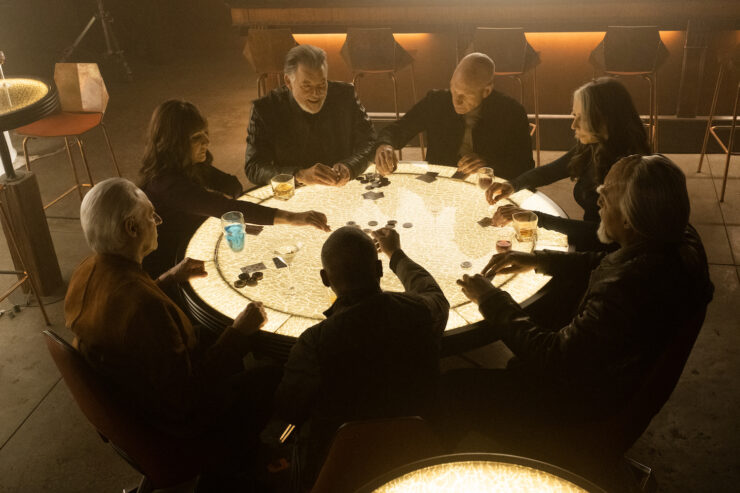
Except for one problem, and it took me until a couple days ago to figure out what it is: There was no need to toss out prior seasons! And, in fact, a lot of what happened in this season might’ve worked better with elements of prior seasons. (Thanks to fellow Tor.com contributor Jaime Babb, whose comments on my reviews of this season helped crystallize those thoughts. And hey, check out Jaime’s excellent piece on Section 31 and its problematic place in Trek…)
Let’s start with Picard needing a ship to track down Crusher in “The Next Generation.” Crusher specifically told him not to trust anyone, in particular not to trust Starfleet. So here’s a crazy idea—why not use La Sirena, which is what he did the last time he needed a ship to do his bidding? (Of course, that would require bringing Santiago Cabrera back—if not necessarily as Rios, as the various holograms that could operate the ship in his absence.)
One of the best things about this season of Picard is the fate of Data. They create a new gestalt being that’s a mix of Data, Lore, and Altan Soong. But given how much of season one was given over to the rights and the evolution of synthetic lifeforms, wouldn’t it have made sense to use Data’s metaphorical daughters—the various synths played by Isa Briones—and the planet full of synths as part of the storyline?
And finally, each season of Picard has involved the Borg in some form or another: the Artifact in season one and the general theme of dealing with ex-Borg from Hugh to Seven to Picard himself; in season two, the creation of a new strain of Borg by the merging of Agnes Jurati and the Borg Queen from an alternate timeline; and, of course, the return of the tattered remains of the Borg Queen in season three. Yet no effort was made to tie these threads together, beyond the general thing-ness of Picard being a former Borg. (Indeed, the fact that Seven is ex-Borg doesn’t even hardly come up this season, which is just weird…)
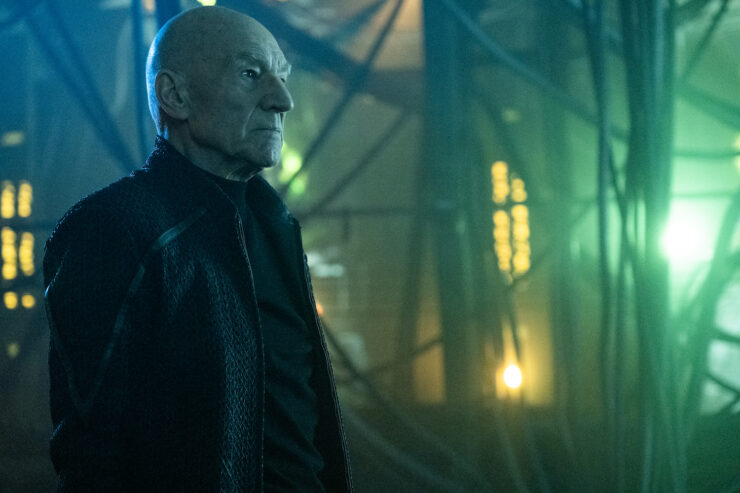
As has far too often been the case with all three seasons, the story barely holds together, and if you blow on it, it falls to pieces. The timeline of events is head-scratchingly confusing. The changeling infiltration of Starfleet and the theft at the Daystrom Institute and its fallout all seem to have happened in an absurdly compressed timeframe. Elements are introduced and then ignored. For example, the changeling infiltration of Starfleet is a major thing, yet it’s cast aside as soon as the changelings’ alliance with the Borg is revealed, resolved unconvincingly quickly in a log entry by Riker. The portal weapon is a major threat that’s completely forgotten once Titan escapes the nebula. Jack’s telepathy is never properly explained—the Borg have never been telepathic except with each other, so his ability to take over other people doesn’t track. Laris says she’ll wait to meet Picard at a bar after the mission is done, and then Laris is utterly forgotten and not mentioned or seen again. We’re told that Vadic and her gaggle of renegade changelings were tortured by the Federation (presumably by Section 31, though that’s not stated outright), but we get no examination of that, no pursuit of justice for what is truly an appalling crime. What has caused the Borg to collapse into their pathetic state is unclear—was it Janeway’s destruction of the transwarp hub in Voyager’s “Endgame”? If so, why were the Borg seen as still active elsewhere like in Prodigy’s “Let Sleeping Borg Lie”? And also if so, why is it Picard that the Queen has focused her animus on (she blames him by name for what has happened to them)? Was the Big Giant Head that was giving Vadic instructions every time she cut off her hand supposed to be the Queen? If not, who was it?
And, of course, there’s the active inconsistencies with prior seasons, from little things like reversing Data’s going from mostly dead to all dead in “Et in Arcadia Ego, Part 2” for the sake of the season’s stunt casting, to big things like a flashback to five years earlier showing Picard saying that Starfleet is his family, even though five years earlier he was a guy running a vineyard who’d quit Starfleet in a huff a decade earlier. And there’s the networking of the fleet using Borg tech, something that was already seen on the Stargazer in season two and which was established there to be a terrible idea that might endanger the fleet, yet no one in the fleet (aside from La Forge, who apparently wrote a memo) thought this might not be the hottest idea? Plus, the scripts this season barely remember that Riker and Troi have another child, and her welfare is hardly considered or mentioned. (This wouldn’t be so bad if Kestra wasn’t, like, the best character ever, and her absence was a crime.)
Still, as has become abundantly clear from most of the commentary on the show, what people love about it is the reunion. A friend, who had lost interest in the show, had heard enough good that she decided to watch this season. She asked on Facebook what the season was about, and I said, “Getting the band back together.” She said, yes, but what’s the story? I said, “Irrelevant. It’s about getting the band back together.”
That’s what everyone is responding to, and it’s for a very good reason: for seven years on television and in four movies, these seven were the heart and soul of what is arguably the most popular iteration of Star Trek. And some of the absolute best moments this season come from these characters just being these characters.
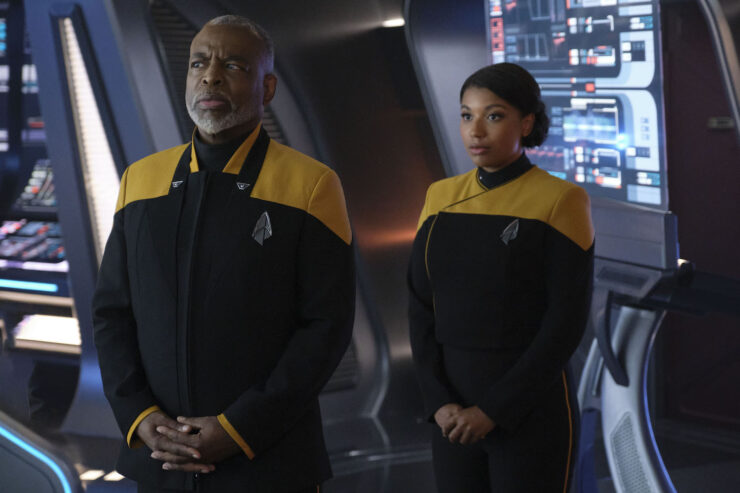
La Forge passionately telling Picard that he needs to turn himself in, and just as passionately trying to convince the amalgam of Data and Lore to help them. The Picard and Riker double act. Troi whupping people upside the head when necessary. The Riker and Worf double act. Picard’s impassioned speech to his son about how he needs his found family back. The Picard and Crusher double act. Picard and Ro coming to an understanding, following the most emotionally fraught conversations. The La Forge and Data double act. Worf showing how he has mellowed with age, but is still one badass motherfucker. Riker and Troi being a glorious married couple, something we still haven’t seen nearly enough of in detail (pretty much just in this season and in “Nepenthe,” one of the highlights of Picard’s first season).
And most of all, Data and Lore’s merging in “Surrender,” which happens, not because one overpowers the other (which is how Lore attempts to take over the gestalt), but because Data shows compassion and gives Lore the one thing he has over on his older brother: lots and lots of memories. Lore has only been alive for a couple of years, truly, while Data has decades of experiences, which he gives to Lore. He “defeats” Lore by showing him love and accepting him.
It’s one of two great Star Trek moments this season; the other is the birth of the cosmozoan life form in the nebula in “No Win Scenario.” In fact, they’re the only Star Trek moments in the entire season, which is another reason why I cringe when people talk about this as one of the best seasons of Trek ever, because this season is not about the human condition, it’s not about seeking out new life and new civilizations, it’s not about exploring the unknown, it’s about, well, getting the band back together. Hell, it isn’t even the best Trek season in the Paramount+ era, as I’d comfortably put the first season of Strange New Worlds, the fourth season of Discovery, and the first season of Prodigy way ahead of it without a moment’s hesitation.
At least the characters are shown to be, not just older, but different. La Forge has settled into his role as a bureaucrat, the head of the Fleet Museum, and a guy with a family, who has long since decided to follow Bilbo Baggins’ advice about adventures. Riker and Troi have settled in as a married couple, and their banter in Vadic’s cell in “Surrender” are some of the best bits in the season. Riker has also become the type of captain that Picard was when we first met him in “Encounter at Farpoint”: a Starfleet veteran who knows his shit and is absolutely the right guy to lead in a crisis.
Data, of course, is the most different, as he’s not just resurrected, but is a fascinating amalgam of three of Brent Spiner’s characters. I really hope that whatever the next twenty-fifth-century show is that Secret Hideout does will make use of Data (and maybe of Isa Briones, too?) to explore this nifty new person he’s become.
Worf is my favorite, though. I mean, Worf has been one of my three favorite Trek characters of all-time, alongside Kira Nerys and the aforementioned Kestra. In addition, I’ve been fortunate enough to write many of Worf’s stories that took place during his time as a diplomat between DS9’s finale and Nemesis, and also one that took place after Nemesis with him as first officer of the Enterprise-E under Picard.
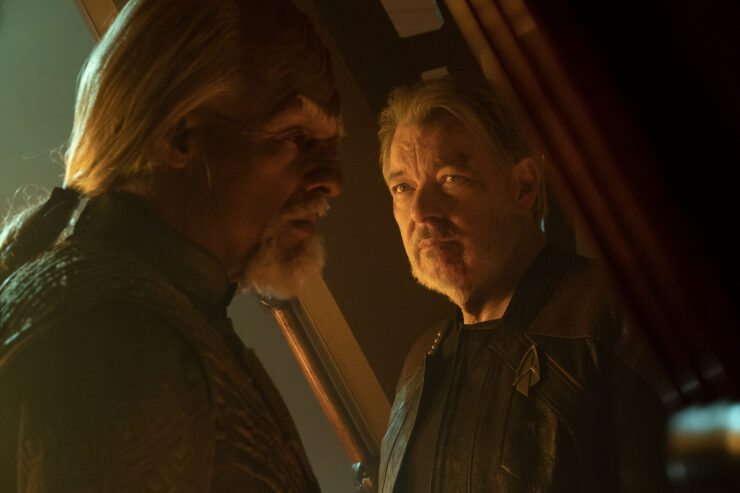
And I simply adore what was done with him this season. A more philosophical and calm Worf, one who prefers pacifism where possible, but also knows how to apply violence when necessary. One who is more at peace with the universe than he’s ever been. Worf’s life has been one of tumult and strife, from the death of his biological parents to the difficulties he had raising his son to the deaths of the two great loves of his life—not to mention the loss of the Enterprise-E, which we’re told in “Vox” he was at least partly responsible for.* His response has been to become calmer, more centered, and with more of a sense of humor. It’s a beautiful thing, and Michael Dorn plays it beautifully.
* Assumptions have been made, particularly in the tie-in fiction, that Worf took over command of the Big E when Picard was promoted to admiral. It is my hope that we will see some of those adventures, whether onscreen or in the tie-in fiction…
Worf also has some of the best scenes with Musiker, a character whom I have seen maligned in some circles, for reasons that have never been clear to me. (Though I can’t help but wonder if a character with the same backstory and difficulties and story arc would be better received if played by a white male. Mind you, I don’t have to wonder all that hard…) I, however, adore the character, and Michelle Hurd and Dorn have superlative master/student chemistry that I would also love to see more of. Some of the season’s best scenes were the two of them in their search for who stole the portal weapon, and it’s great stuff. (It also gave us two excellent guest stars in Aaron Stanford’s Ferengi gangster Sneed and especially Kirk Acevedo’s Vulcan crimelord Krinn.)
Two characters I haven’t really discussed much are Picard and Crusher, and here’s where I feel the season particularly fell down. On the one hand, I’m thrilled to see that Picard and Crusher did finally get together. (Riker’s line to Jack in “Seventeen Seconds” about how he saw Jack cooking for years was particularly poignant, as the inability of TNG’s writers to do right by the chemistry between these two characters was a point of great frustration, particularly the wholly unsatisfying conclusion of it in “Attached.”) But then Crusher accidentally gets pregnant—a state of affairs that strains credulity beyond the breaking point, given twenty-fourth-century medicine—and then runs away and hides with her kid for twenty years.
Of all the WTF plot points in this season, that’s the WTFiest. When we see Crusher mère et fils, they’re on the Eleos, working for Mariposas, a Doctors-Without-Borders-style service that provide medical aid to places that don’t always have it. (In a nice touch that I missed, it’s named after the organization founded by Rios and Ramirez in the twenty-first century following season two.) When we find out that Jack is Picard’s kid, Crusher explains that she ran away because Picard’s life was too dangerous.
Except—and I know I’ve said this before, but it bears repeating—this makes nothing like sense. Crusher wanted to keep her son safe, so she leads a life of sufficient danger that her son has multiple identities and warrants out on him. She wants to keep him safe from the danger of being Picard’s kid—except for the vast majority of Jack’s lifetime, Picard was sitting on his ass in Labarre growing grapes and making wine, having, as I said before, left Starfleet in a huff. In fact, he left in a minute-and-a-huff, and nobody gave a rat’s ass about him enough to try to attack him or anything like that.
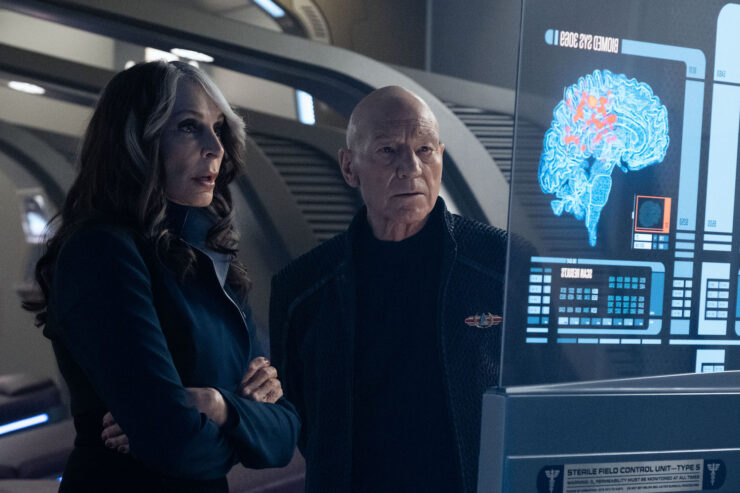
Crusher has a few nice bits in the season—she’s the one who figures out about the cosmozoan, for one thing—but she mostly just gets to be Jack’s mother, which is tiresome. Her entire storyline is in relation to the men in her life, and I don’t get why she can’t be a character on her own.
As for the title character, it’s funny, but I have less of an impression of him than of any of the others. He does have that one great speech to Jack when he’s trying to rescue his son from the Borg Queen, but aside from that, he’s the person I least remember from this season.
I will say this: the show leaves us in a good place. Seven is now the captain of the Enterprise-G (the rechristened Titan), which is a joy to see. It’s now firmly established in the canon of Star Trek that a queer woman is a captain of the Enterprise. It’s especially heartening to see Seven, who started out as an aggressively male-gazed character, put in a catsuit and high heels to make Voyager appeal to a tiresomely specific demographic, first become the most compelling character on the show (due in part to Ryan’s superlative acting skills), and now join one of the most hallowed pantheons in popular culture.
And her first officer of a woman of color. Aside from Discovery’s pilot episode, we haven’t had a captain/first officer pairing that’s both women, and if the spinoff everyone wants of Seven as captain of the Enterprise-G really does happen, it’ll be a great day for the future. Because Star Trek is at its best when it shows all of humanity united for a common goal.
Plus, all these beloved characters are still around to make periodic guest shots. I’d especially like to see more of Worf, please and thank you…
Ultimately, this season of Picard was a really good snack. Not very filling, not a satisfyingly full meal, but still quite yummy. Even if it ultimately doesn’t entirely sate your hunger, it tastes really good. And hey, snacks, like swords, are fun, and this season was definitely that.
Keith R.A. DeCandido will be an author guest at HELIOsphere 2023 this coming weekend in Piscataway, New Jersey, alongside guests of honor Sharon Lee, Steve Miller, Charles Gannon, and David Mattingly. He’ll be doing panels and readings and signings and stuff. Check out his full schedule here.










